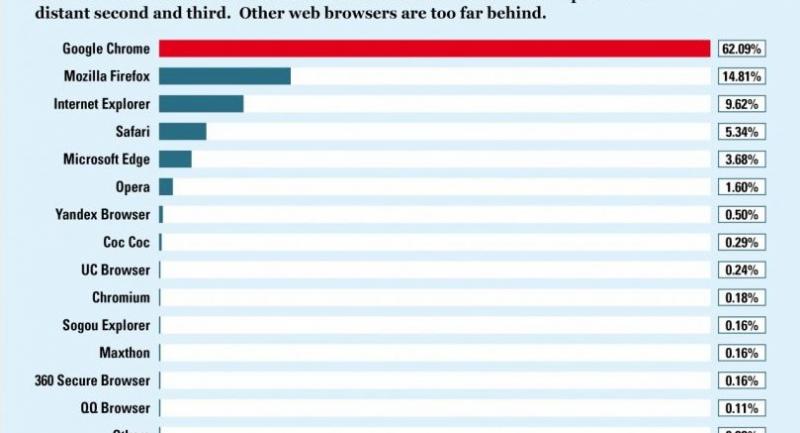

- #Chrome vs safari vs firefox vs internet explorer android#
- #Chrome vs safari vs firefox vs internet explorer code#
- #Chrome vs safari vs firefox vs internet explorer password#
- #Chrome vs safari vs firefox vs internet explorer plus#
- #Chrome vs safari vs firefox vs internet explorer download#
Best web browsers 2021: PrivacyĬhrome doesn’t do an awful lot to protect your privacy by default, but it does automatically send websites a “Do Not Track” message, which tells them that you don’t wish your activity to be monitored and recorded.
#Chrome vs safari vs firefox vs internet explorer code#
Overall though Microsoft Edge is probably the safest choice, since it was coded from the ground up to meet the security demands of the modern web, and contains little in the way of legacy code to exploit. Verdict:Īll of the major browsers are designed with a strong focus on security, and they all receive regular automatic updates to close any newly discovered holes.


Still, unlike Chrome and Edge, Firefox is open-source, so there are plenty of eyes on it, and vulnerabilities can be quickly addressed. Mozilla is developing a new sandboxing system, but for now, this is only available on Linux and macOS. The browser isn’t as thoroughly sandboxed as its rivals either.
#Chrome vs safari vs firefox vs internet explorer password#
For maximum security, Chrome can generate a new, unguessable password for you (along the lines of “cwS4ras7PtzUZNAq”), and automatically log you in next time you visit the site.įirefox also has a built-in password checker, but breach warnings don’t appear directly in the browser – you have to check your status in the program’s settings page or visit the company’s Firefox Monitor website to check if your ID has been exposed. You can optionally enable a Secure DNS feature too, which prevents attempts to redirect you from legitimate sites to fake ones.Īn additional neat feature of Chrome is its built-in password checker, which warns you if you log into a site using credentials that are known to be compromised – giving you a chance to change your password before someone else gets into your account. It also aims to steer you away from phishing sites, and untrusted downloads are blocked completely. Google Chrome isn’t quite so inherently secure as Edge, but again it runs browser processes in sandboxes and features built-in warnings against dodgy websites.
#Chrome vs safari vs firefox vs internet explorer download#
Indeed, the first release of Edge didn’t even support downloadable add-ons – although, as we’ll discuss below, that’s no longer the case.Įdge also uses Microsoft’s SmartScreen technology, which analyses web pages and warns if you’re trying to visit a suspicious-looking site, or about to download a file that isn’t well known and widely deployed – both potential red flags for malware. With Edge, however, the company has learnt its lesson: the new browser runs entirely in a sandbox, and old, vulnerable technologies like ActiveX and “browser helper objects” aren’t implemented at all in the new browser. When it comes to security, Microsoft has the most to prove: the old Internet Explorer browser was hacked many times over the years, allowing attackers to hijack users’ computers. Verdict:įirefox’s cross-platform “save for later” function is both appealing and practical, but Microsoft deserves credit for its Collections and language-learning features – and the inclusion of Chromecast support clinches the deal. You can use this for regular web pages too, allowing you to revisit sites you’ve saved from any device. Its reader mode includes an elegant floating toolbar, which combines font controls and a text-to-speech button with the free companion Pocket service, which lets you save pages for later review with a single click. Firefox doesn’t support groups at all, but it does let you shift-click to select multiple tabs and carry out actions on all of them at once.Īrguably the best reader experience is offered by Firefox. Chrome has its own tab grouping feature, which can be accessed by right-clicking in a tab header and selecting “Add tab to group”. You can name and colour-code these groups, but they don’t sync across devices like Edge’s Collections. You can group individual pages together, and save, synchronise and export Collections of pages as a single item. Microsoft Edge also includes an advanced feature called Collections which is great for managing multiple tabs.
#Chrome vs safari vs firefox vs internet explorer android#
That’s something the regular Firefox browser can’t do – although the Android edition can, using the casting framework that’s built into the mobile OS. For one, Chrome and Microsoft Edge both support Google’s casting technology, allowing you to beam web pages and applications directly to a Chromecast device or compatible TV.

And in each case, an integrated task manager lets you monitor the performance and resource usage of your various tabs.Įven so, there are a few notable differences between browsers.
#Chrome vs safari vs firefox vs internet explorer plus#
They also all include basic features like bookmarking and password saving, plus private browsing modes that let you temporarily surf in relative anonymity.


 0 kommentar(er)
0 kommentar(er)
